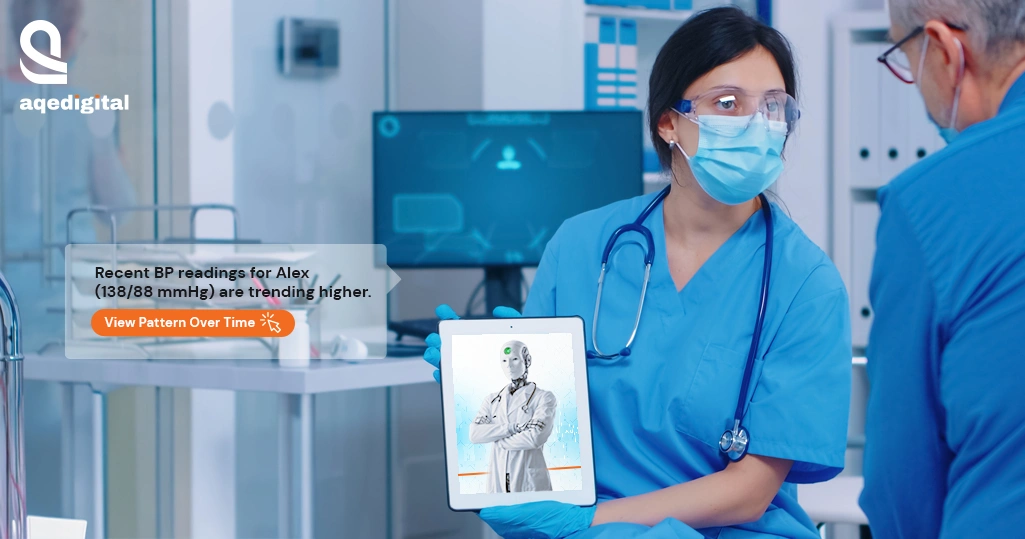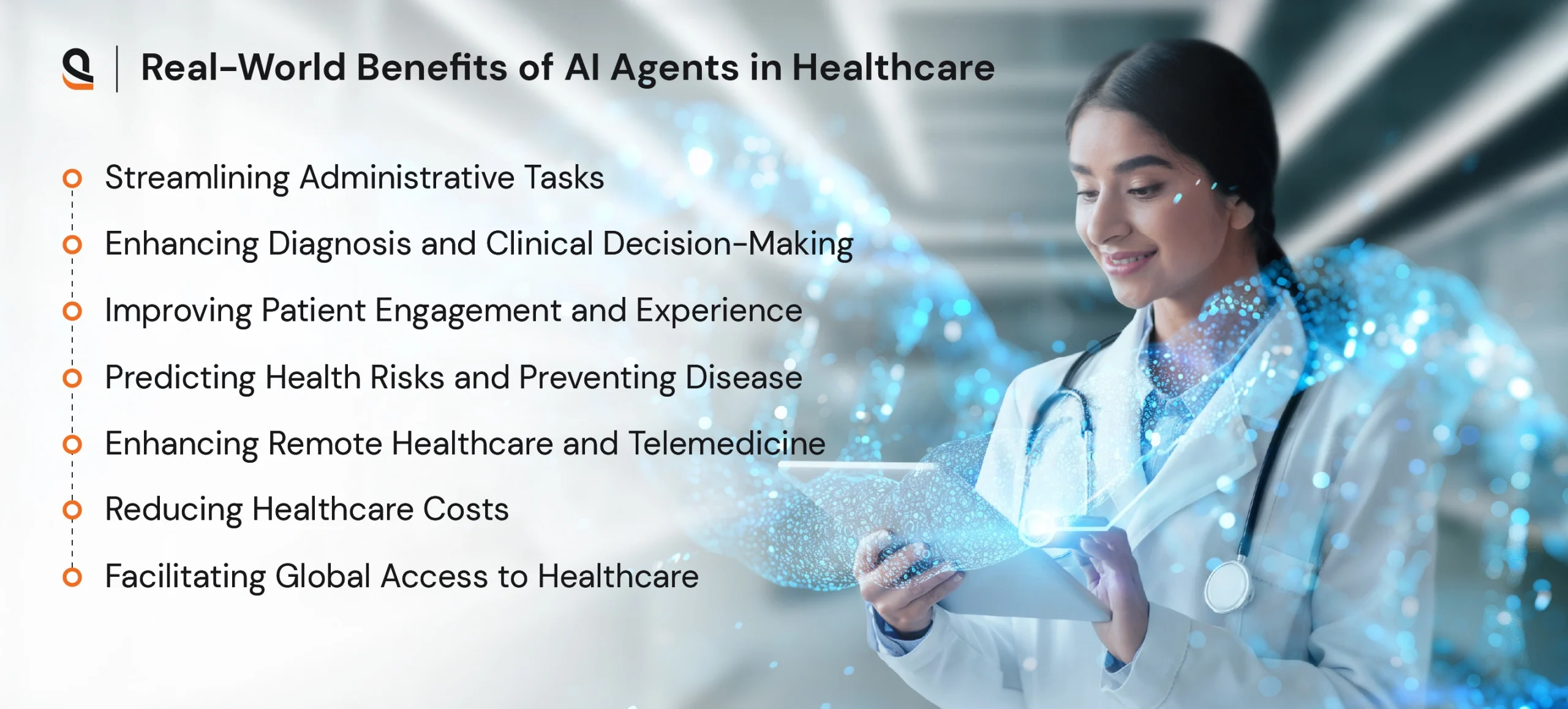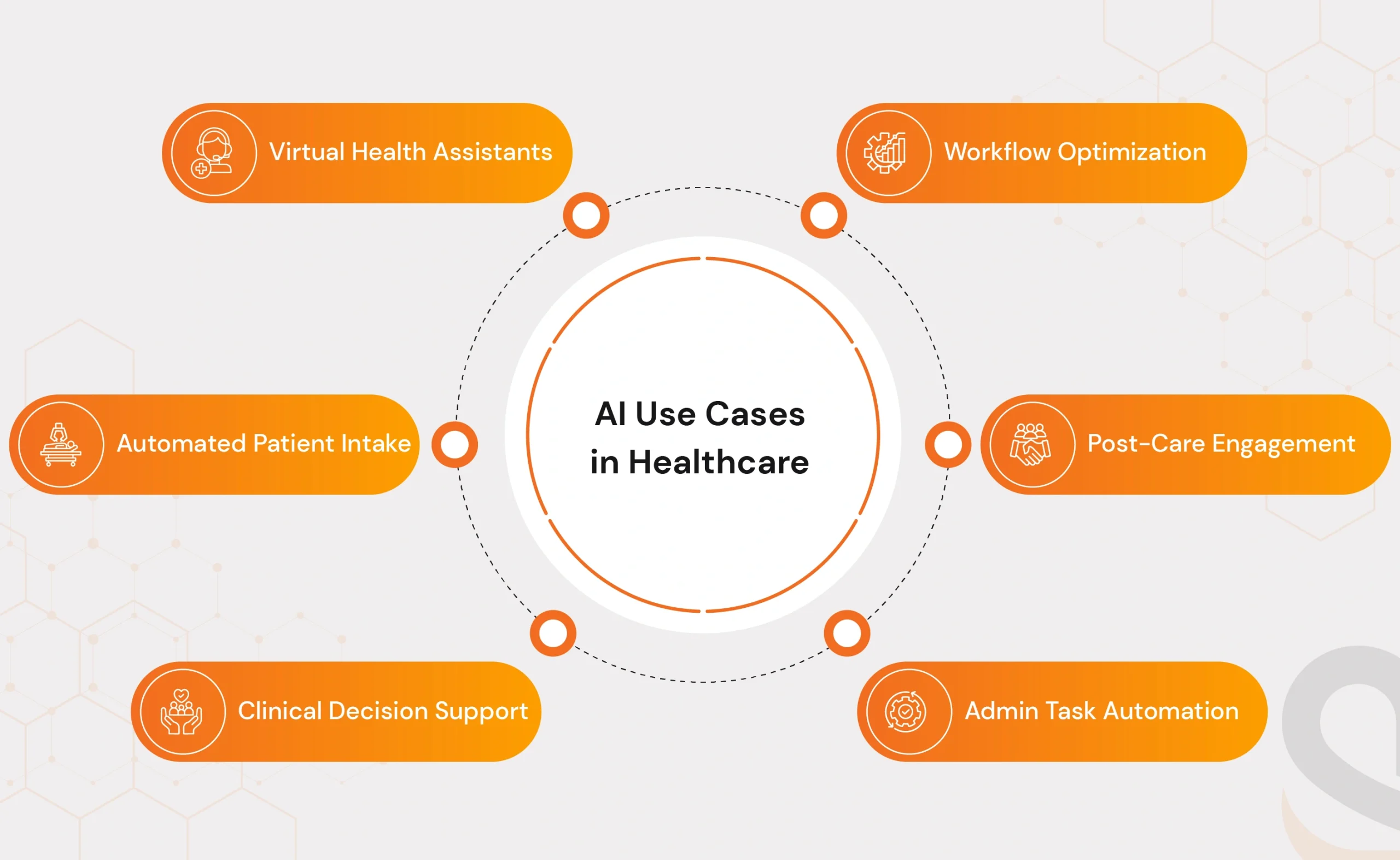Implement barcode scanning or RFID tracking to ensure real-time, accurate inventory counts. This method reduces human error and discrepancies, allowing you to spot issues as they arise, rather than during periodic audits.
-
- AI in healthcare has the potential to generate $150 billion in annual savings for the U.S. healthcare economy by 2026. – McKinsey Report
From virtual assistants managing patient inquiries to predictive algorithms identifying at-risk patients, these AI-powered tools are changing how healthcare professionals interact with data, resources, and, most importantly, their patients. Healthcare AI agents are shifting from futuristic concepts to real, actionable tools that are already improving the quality of care..
As we look ahead, AI agents for healthcare aren’t just improving existing systems; they’re paving the way for groundbreaking innovations in medical treatment, remote care, and patient engagement. Whether it’s improving clinical decision-making or providing personalized care plans, AI in healthcare is more than just a buzzword — it’s a game-changer.
But with these advancements come essential questions: Can AI agents fully integrate into current healthcare systems? Will they enhance the patient experience, or could they complicate things further? And perhaps the most pressing question — how do these AI agents in healthcare translate into tangible benefits for patients and providers alike?
With this article, let us explore the real-world benefits of AI in healthcare, from reducing administrative burdens to accelerating diagnoses, and learn about the use cases for AI agents that demonstrate their growing impact in medical practice.
Whether you’re a healthcare professional, a tech enthusiast, or just curious about the future of medicine, understanding the potential of healthcare AI agents is key to unlocking a smarter, more efficient healthcare system.
What are AI Agents in Healthcare?
Think of AI agents as virtual helpers, but instead of just answering basic questions, they’re tackling more complex tasks like analyzing medical data, predicting health outcomes, and even suggesting treatment options. In healthcare industry, they don’t replace doctors, but they make doctors’ jobs easier by providing real-time insights and handling time-consuming tasks.
“AI Agents in Healthcare are intelligent software systems that use artificial intelligence (AI) to perform tasks that would normally require human effort. These AI agents are designed to assist healthcare professionals in everything from managing patient data to supporting complex medical decisions.”
It pulls up your medical history, helps schedule your appointment, and even answers your health questions. You might not see it, but this AI agent is already working behind the scenes to make your visit faster and smoother.
Types of AI Agents in Healthcare
There are a variety of AI agents in healthcare, each with its own special role:
- Virtual Assistants: These AI-powered assistants help with everything from scheduling appointments to answering patient queries. Think of them as a friendly receptionist, available 24/7, making sure no call or request is missed.
- Clinical Decision Support Tools: These AI agents analyze medical data — from lab results to patient histories — and suggest the best course of action. They help doctors make more informed decisions, faster.
- AI Chatbots: Ever used a chatbot on a website? Imagine one that can assist you with medical information, from symptoms to prescriptions. These AI agents are designed to help patients by providing instant information, helping with follow-up care, and even reducing the need for unnecessary visits.
- Predictive Analytics Tools: These agents look at patterns in health data to predict future health issues. By spotting potential risks early on, they give doctors a chance to act before problems become serious.
How Do Healthcare AI Agents Work?
AI agents in healthcare work by combining smart technologies like machine learning and natural language processing to understand data and help both doctors and patients make better decisions.
They learn from large amounts of medical data — things like patient records, lab results, and past diagnoses — to spot patterns and make predictions. For example, an AI agent might help identify patients at risk of heart disease before symptoms even show up.
These agents can also understand and respond to everyday language. So when a patient asks a chatbot about their symptoms, the AI can give reliable, helpful information instantly — no need to wait for a call back.
In simple terms, AI agents for healthcare are digital helpers: they speed up tasks, support smarter decisions, and improve care without replacing the human touch.
Practical Advantages of AI Agents in Healthcare
As AI agents in healthcare continue to make their mark, their real-world impact is becoming more and more apparent. These intelligent tools are not just improving how healthcare systems operate; they’re also transforming the patient experience, empowering healthcare providers, and making medical care more accessible.
In 2023, Mount Sinai Health System began using AI-powered tools to support clinical decisions, helping doctors spot early signs of sepsis. The system used predictive analytics to flag at-risk patients and send real-time alerts to physicians, which helped reduce ICU admissions by 15%. It’s a real example of how AI is quietly making a big difference—not just in theory, but in the day-to-day delivery of care.
Let’s dive into the real-world benefits of AI agents in healthcare.
Streamlining Administrative Tasks
One of the biggest headaches for healthcare providers is the sheer volume of administrative work. From managing patient records to scheduling appointments, the tasks can be overwhelming and often lead to inefficiencies. Here’s where AI agents step in. They can automate repetitive administrative tasks, freeing up valuable time for healthcare workers to focus on patient care.
For instance, AI agents can handle appointment scheduling, send reminders, process billing, and even handle insurance claims. According to a 2019 report by Accenture, AI in healthcare could save the industry up to $150 billion annually by reducing the administrative burden. This means less time spent on paperwork and more time spent providing care.
Enhancing Diagnosis and Clinical Decision-Making
AI agents are also becoming invaluable in clinical decision-making. By analyzing vast amounts of data, including medical records, lab results, and imaging, these tools help doctors arrive at more accurate diagnoses, often faster than traditional methods.
Take radiology, for example. AI-powered imaging tools can analyze X-rays, MRIs, and CT scans with incredible precision. Studies have shown that AI can match or even outperform human radiologists in detecting conditions like pneumonia, lung cancer, and breast cancer. By flagging potential issues early, AI agents allow doctors to intervene faster, ultimately improving patient outcomes.
Beyond imaging, AI agents also assist doctors in recommending the most effective treatments based on a patient’s unique health profile. These systems don’t replace medical professionals but serve as intelligent assistants, offering real-time insights that lead to better-informed decisions and support more effective clinical data management practices.
Improving Patient Engagement and Experience
Patients are increasingly looking for healthcare that fits their busy lives, and AI agents are making that possible. Virtual assistants powered by AI allow patients to engage with healthcare systems more easily, whether it’s scheduling a visit, asking questions about medications, or tracking symptoms.
AI agents also enable personalized care, which can increase patient satisfaction. For example, an AI-powered tool might send personalized reminders for medication refills, recommend lifestyle changes based on health data, or even follow up with patients after treatment to track progress. This level of engagement can make patients feel more in control of their health, improving adherence to treatment plans and ultimately leading to better outcomes.
Furthermore, AI’s ability to provide instant, around-the-clock support ensures that patients don’t have to wait for office hours or appointment slots. They can get answers to their questions or receive guidance whenever they need it — all thanks to AI agents.
Predicting Health Risks and Preventing Disease
One of the most exciting aspects of AI in healthcare is its ability to predict potential health risks before they become serious problems. Predictive analytics powered by AI agents can analyze a patient’s medical history, lifestyle choices, and even genetic data to forecast possible future health issues.
For example, AI agents can identify patients at high risk of conditions like heart disease, diabetes, or stroke, often long before symptoms appear. This allows healthcare providers to take proactive steps, whether through preventive treatments, lifestyle changes, or early screenings. As a result, patients can avoid major health crises, improving both the quality and longevity of their lives.
Enhancing Remote Healthcare and Telemedicine
The demand for telemedicine has surged, and AI agents are a key part of this shift. With the rise of virtual care, patients no longer need to visit a clinic in person for every check-up. AI agents are used to remotely monitor patient health, assess symptoms, and even provide basic diagnoses or treatment suggestions through telemedicine platforms.
For example, wearable devices connected to AI agents can track things like heart rate, blood pressure, or glucose levels. If something unusual is detected, the system can alert both the patient and their healthcare provider. This continuous monitoring allows for timely interventions and helps avoid unnecessary hospital visits, all while empowering patients to take charge of their own health.
AI is also making virtual consultations more effective. AI assistants can triage patients by asking about symptoms, history, and even performing initial screenings before a human healthcare provider steps in. This makes virtual care faster and more efficient, especially in settings with high patient volumes.
Reducing Healthcare Costs
With healthcare costs soaring globally, AI agents offer a way to drive efficiency and reduce unnecessary expenses. By automating routine tasks, improving diagnostic accuracy, and preventing expensive complications, AI helps healthcare systems save money.
AI can help healthcare providers identify which patients are more likely to be readmitted, allowing them to take preventive steps early on. This not only improves patient outcomes but also helps reduce hospital readmissions and avoid unnecessary costs. On top of that, AI can cut down on errors like misdiagnoses or incorrect prescriptions, which often lead to serious and expensive complications.
Facilitating Global Access to Healthcare
Perhaps one of the most impactful benefits of AI in healthcare is its potential to bring quality care to underserved and remote areas. With AI agents, healthcare systems can reach patients in rural or low-resource areas who may not have access to specialized care.
AI-powered diagnostic tools, remote monitoring, and virtual consultations make healthcare more accessible, regardless of geographical location. This is particularly important in developing countries where medical professionals may be scarce or overburdened. AI helps bridge the gap, ensuring that more people can receive timely and appropriate care.
The Impact of AI Agents for Healthcare: Use Cases You Should Know
Healthcare AI agents aren’t just about automation—they’re about enabling better care, more satisfied patients, and more resilient organizations. Whether it’s streamlining workflows or supporting patients around the clock, the use cases for AI agents in healthcare are as practical as they are powerful.
| Use Case | Summary | What They Do | Benefits |
| Virtual Health Assistants | AI agents in healthcare act as always-on digital companions for patients, helping bridge the gap between clinic visits. |
|
Reduces staff workload, improves patient engagement, and helps drive better health outcomes. |
| Automated Patient Intake | Healthcare AI agents streamline patient onboarding by collecting information upfront—digitally and intelligently. |
|
Cuts down wait times, improves accuracy, and frees up front-desk teams for higher-value work. |
| Clinical Decision Support | Healthcare AI agents can assist clinicians by offering fast, data-driven insights at the point of care. |
|
Increases clinical accuracy, supports faster decisions, and improves overall care quality. |
| Workflow Optimization | Hospitals can use healthcare AI agents to coordinate logistics and ensure smoother operations across departments. |
|
Improves operational efficiency, lowers overhead, and enhances the overall patient experience. |
| Post-Care Engagement | AI agents in healthcare keep the conversation going after discharge to reduce readmissions and track recovery. |
|
Boosts long-term outcomes and keeps patients connected to care without overloading staff. |
| Admin Task Automation | Healthcare organizations can deploy AI agents to handle repetitive administrative work reliably and quickly. | Healthcare organizations can deploy AI agents to handle repetitive administrative work reliably and quickly. |
|
Get Real Outcomes with AI Agents for Healthcare
We understand that healthcare is high-stakes, complex, and deeply personal. That’s why our Healthcare AI Solutions go beyond chatbots and surface-level automation. We offer full-stack AI, Machine Learning, Data Engineering, and Cloud services specifically tailored for the evolving needs of modern healthcare.
- We don’t do “AI for show” We build healthcare AI agents and models that actually solve problems.
- Data is only powerful if it’s clean, connected, and actionable. We turn scattered health data into strategic gold.
- We architect cloud systems that are secure, scalable, and ready for growth.
Whether it’s providing decision support, automating tedious tasks, or predicting patient risks, we’re your GO-TO digital transformation partner in making healthcare AI agents work seamlessly for you and your team.





